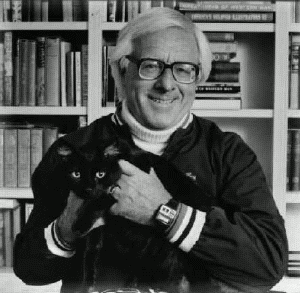(1920 - 2012)
On August 22nd, 1920, Ray Douglas Bradbury was born in Waukegan in Illinois. During the Great Depression his father lost his job in Illinois and the Bradbury family was forced to leave their home in Waukegan to finally settle in southern California in 1934. Four years later, Bradbury graduated from Los Angeles High School. In school, Bradbury enjoyed spending time alone reading and writing, developing his creative potential. Bradbury spent much of his young adult life in the library, but soon he began working and writing for several magazines, also selling newspapers to make ends meet. Quickly he found his niche as a science fiction author, writing short stories, plays and novels that combined mystery, technology and horror. At age of 27, he married the love of his life, Marguerite McClure whom he met while she was working as a clerk at a bookstore. McClure was the breadwinner in the early days of their marriage, supporting Bradbury as he worked on his writing for little to no pay. The couple had four daughters, Susan (1949), Ramona (1951), Bettina (1955) and Alexandra (1958).. In 1953, Bradbury published perhaps his most famous work, Fahrenheit 451, a powerfully gripping tale of a futuristic society that outlaws the possession of books. Bradbury has been given dozens of literary awards and honours, demonstrating his writing ability as well as his unique presence as a societal revolutionary. His works go far beyond the written page; his name is known among theatre goers, television viewers and radio listeners. Most impressively, Bradbury’s writing is known to millions of school children, both in the United States and abroad, who strive to grasp the meanings of his dark metaphors. Ray Bradbury will always be remembered, not only by his incredible writing, but also by the powerful themes of his science fiction. Bradbury died in Los Angeles on June 5th, 2012, at the age of 91.
My selection:
The Martian Chronicles : (Chroniques Martiennes) 1950
This book relayed a narrative of Earthly colonizers destroying a utopian Martian civilization and was told through a series of intertwined stories that mocked very real issues of the day : racism, capitalism, and superpowers jockeying for control. It is a collection of linked short stories. The tone of the stories varies; some are horror tales and others are earnest parables of human folly. The Martians sometimes behave like monsters and sometimes like saints. Some of the stories embrace progressive political values. Written during the Cold War, they criticise imperialism, racism, environmental pollution, censorship, and the nuclear arms race.
Fahrenheit 451: 1953
Guy Montag is a fireman in charge of burning books. A young girl named Clarissa McClellan opens his eyes to the emptiness of his life with her questions and peculiar love of people and nature. After his wife Mildred attempts suicide, after he witnesses an old woman let herself be burned with her books, and after he hears that Clarissa has been killed by a car, Montag searches for answers in books he has stolen and hidden. He looks to Mildred for help, but she prefers television to her husband's company and cannot understand why he would want to take the terrible risk of reading books. Montag meets an old intellectual named Faber and asks him for help in understanding what he reads. Meanwhile, Beatty, Montag's superior, has guessed that Montag is experimenting with books and tells him that he should turn in the books he stole within 24 hours. Faber explains the value of books to Montag. Montag goes to the fire station and hands over one of his books to Beatty. An alarm comes through, and they rush off to Montag's own house. Mildred rushes out. Beatty forces Montag to burn the house himself and he places him under arrest. But Montag turns the flame-thrower on his superior and burns him to ashes. He also knocks the other firemen unconscious and begins to run away with some books. He hides these into the other firemen's houses and calls in an alarm from a payphone. He goes to Faber's house where they plan to go to St Louis to see a retired printer who may be able to help them. But Montag has to escape into the country. There he finds a group of renegade intellectuals led by a man called Granger who welcomes him. They are part of a nation-wide network of book-lovers who have memorised many great works of literature and philosophy. They hope that they can be of some help to mankind in the aftermath of the war that has just been declared.


